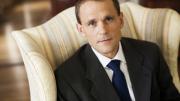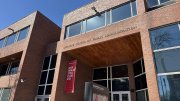With a lead gift of $10 million—one of the largest in the school’s history—the Harvard Graduate School of Education (HGSE) announced that it would move forward with plans for the Harvard Teacher Fellows Program (HTF), a new avenue for undergraduates interested in teaching. The program will train them to become middle- and high-school teachers of math, science, social studies, and English.
The donation from two anonymous Harvard alumni, along with financial support from Richard L. Menschel, M.B.A. ’59, and Ronay Menschel and President Drew Faust, brings funding for the program to $14.5 million and will enable it to launch with seniors from the class of 2016. The Education School’s fundraising goal for HTF totals $20 million, enough to sustain efforts to train 700 fellows across 10 years. Beginning with 40 fellows in the inaugural cohort, it will expand eventually to graduate around 100 each year.
HGSE dean James E. Ryan highlighted two aspects of the program. First, all fellows will receive eight months of training before they set foot in the classroom in the fall, as new teachers: this includes coursework in their senior spring, a three-week teaching laboratory in local schools that July, summer classes at HGSE, and mentored teaching at the Cambridge Harvard Summer Academy (CHSA).
The program’s second main feature is its provision of support to fellows during their first few years as teachers. Since that period is “crucial” for young teachers, said Ryan, fellows will begin teaching at a reduced load, allowing time for further coursework and coaching via video conference (both on-demand, and in scheduled group sessions). The fellows will return to campus for their second summer for a capstone course, and will earn initial Massachusetts teaching licensure; they will also have the opportunity to teach again at CHSA and to take the two additional courses that will allow them to earn a master’s degree at HGSE. Ideally, fellows will then begin full-time positions at the school where they taught the previous year.
HGSE had considered expanding the program to include training fellows to teach in elementary schools. “We talked about that a lot,” Ryan said, but for now, “Our aim is to start this program with a particular focus, and to learn as we go along.” Providing fellows with the support system of their peers will impose further constraints. In order to place fellows together in “clusters,” the program will be limited to urban areas, explained Ryan, calling it an “inevitable trade-off.”
The Harvard Teacher Fellows Program joins two existing HGSE teacher-training programs, including the Undergraduate Teacher Education Program (UTEP). UTEP offers students in the College a way to earn a teaching license while completing the general and concentration requirements of their undergraduate degree; it requires four courses, a pre-practicum, and a field placement. Due in part to its heavy demands on students’ schedules, the program remains relatively small. (Although the number of undergraduates seeking initial advising appointments with the UTEP director nearly tripled in the last three years, to 120, the program enrolls only around 25 students each year.) UTEP will continue for the time being, allowing current participants to finish the program, and maintaining a pipeline for those who prefer its four-year pace to HTF’s five. Ryan said that the school is interested in how the two programs might work together. “There are different avenues for students with different needs,” he said, and there may be a benefit to offering “multiple pathways for undergraduates to enter education.” Also up for evaluation: the Education School’s master’s program in teaching. Its size has been “diminishing” for several years, Ryan noted, and now counts fewer than 20 students. Once HTF has been operational for a few years, this pathway too may be phased out.
Asked how HTF might compare with Teach For America—Harvard undergraduate applications there reached a peak of 300 in 2011, and have declined somewhat since—Ryan called himself a fan of the organization, saying, “I don’t see this as competition with TFA.” He characterized TFA’s primary purpose as “to expose” people to the classroom, and thus to “spark a lifetime interest in education.” HTF, instead, will aim to create career teachers, and the dean added he was excited about what it could do for teaching and for teacher-prep programs: the Education School's goal is to create a model that can be replicated elsewhere.
“I’ve been excited about this for a really long time,” President Drew Faust said this morning. Speaking by phone, she commented on the program’s broader significance in the College’s efforts to offer more public-service opportunities to its graduates. Faust called the University’s financial support of the HGSE program “a statement about how important teaching is.” Connecting HTF to successful efforts in Finland to make teaching a culturally valued and highly regarded career path, she added, "I want this program to say we value teaching, too, and see it as a noble career choice: the teaching profession."
Ryan said that in the coming months, a committee will launch a search for a program director, who will then help to hire four subject-specific Master Teachers in Residence; all five will be full-time faculty positions. Drawing on existing relationships established by the faculty and HGSE’s Ed.L.D. program (which mandates that third-years take “field placements”), it will also reach out to school districts and charter systems that might be interested in hiring fellows.
With HTF’s initial “planning year” underway, HGSE has put into motion one of its several ventures to strengthen ties to the College and meet increased undergraduate interest in education—one of the priorities laid out in the Education School’s capital campaign, launched this September. Ryan said that the school is also putting together a proposal to establish Education Studies as a secondary concentration, though that will focus on academic study of the field, not on vocational preparation.
HGSE will circulate a formal announcement later this week. More information about the program, including the application process and potential placement, will be available to interested students this coming spring.









